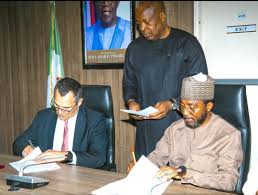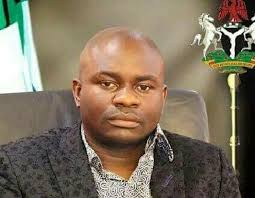Business
Okowa Charges ICAN To Propel Nation’s Economic Growth

Business
Paper Industry’s Economic Contribution Hits N398bn

The contribution of the paper industry rose to N398.8billion in 2023 from N356billion it recorded in 2022.
Chief Executive Officer of the Centre for the Promotion of Private Enterprise (CPPE), Dr. Musa Yusuf, disclosed this in a report released to mark the inauguration of World Envelopes Day in Lagos.
Marking the event, which also commemorated the 50th anniversary of envelope manufacturing firm, FAE Limited, Yusuf stated that the paper industry has a profound economic impact across all sectors of the economy.
He, however, noted that the growth in digital technology had greatly disrupted the sector, especially as a mode of communication.
“As of 2023, the value of the Nigerian paper industry was N398.8billion naira, according to the National Bureau of Statistics.
“The value was N365bn in 2022; N363 billion in 2021; and N255billion in 2020. This is a significant contribution to our GDP. However, when compared to the size of our economy, which is estimated at N230trillion as of 2023, it is still very small”, the CPPE boss stated.
Yusuf said the paper industry had been largely in recession because of the digital technology disruptions and other macroeconomic headwinds, especially relating to exchange rate depreciation, forex liquidity crisis and high cost of fund and energy cost escalation.
He emphasised that the paper industry had a profound economic impact across all sectors of the economy, which underscored the need for government intervention in the sector.
In her opening remarks, the Managing Director of FAE Limited, Funlayo Bakare, described World Envelopes Day as the brainchild of the company, which sought to set aside April 16 as a day to celebrate the fundamental role envelopes play in daily communication.
“As we celebrate our golden jubilee, we are delighted to announce the inauguration of World Envelopes Day, to be celebrated annually on the 16th day of April.
“This is a pioneering initiative by FAE Ltd in accordance with our leadership position in the sector.
“The establishment of World Envelopes Day is to raise awareness about the importance of envelopes in various aspects of human endeavour, including personal correspondence, business transactions, and creative expressions”, she said.
The Publisher of The Guardian Newspaper, Maiden Ibru, who chaired the occasion, stressed the need to strike a balance between digitalisation and physical paper production, especially due to the indispensable role paper plays in cultural preservation.
Nigeria once had three paper mills: the Nigeria Paper Mill Limited, located in Jebba, Kwara State; the Nigerian Newsprint Manufacturing Company Limited, Oku-Iboku, Akwa Ibom State; and the Nigerian National Paper Manufacturing Company Limited in Ogun State.
The mills are no longer operational, and the country has had to depend on importation to make up for the shortfall.
The Asset Management Company of Nigeria has taken over the management of NNMC over unpaid debts.
Business
Aviation Union Threatens Strike Over Revenue Deduction

The Air Transport Services Senior Staff Association of Nigeria (ATSSSAN) has said it would embark on industrial action if the Federal Government refuses to exempt aviation agencies from a directive that seeks to deduct 50 per cent from their Internally Generated Revenue (IGR).
ATSSSAN disclosed this in a communique issued by its National Executive Council (NEC) after its National Economic Council meeting in Ibadan, Oyo State.
The NEC, which had in attendance all 17 affiliates of ATSSSAN comprising all branch Chairmen, Secretaries, and national officers, reiterated calls for the exemption of the aviation agencies from the deduction of 50 per cent of their IGR under the Fiscal Responsibility Act.
The association said the agencies were not established for profit, hence stifling them of the required funds would jeopardise the effective performance of their safety and security mandates.
ATSSSAN warned that if the Federal Government insist on the deduction, it would compound the current financial state of the agencies, and “we may be forced to direct all aviation workers to down tools until the government reverses itself”.
Last year, the Federal Government directed the Office of the Accountant General of the Federation to immediately commence the presidential directives on a 50 per cent automatic deduction from the IGR of Federal Government-owned enterprises.
The Minister of Finance and Coordinating Minister of the Economy, Wale Edun, had issued a circular titled, “Re: Implementation of the Presidential Directives on 50 per cent Automatic Deduction from Internally Generated Revenue of Federal Government Owned Enterprises (FGOEs)”.
According to the circular, all partially-funded Federal Government agencies and parastatals (receiving capital or overhead allocation from the Federal Government’s budget) should remit 50 per cent of their gross IGR, while all statutory revenues, like tender fees, contractor’s registration, and sales of government assets, among others, should be remitted 100 per cent to the sub-recurrent account.
ATSSSAN stated its apprehension over what it perceives as deliberate efforts by certain private airlines to stop their employees from forming labour unions.
Citing Section 40 of the Nigerian Constitution and international labor norms, the association contends that such actions constitute a violation of workers rights.
The statement, however, did not specify the airline operators suppressing workers from joining unions.
Part of the statement read, “The NEC-in-session calls on all employers in the private sector in the aviation industry to respect collective bargaining agreements in order to avert industrial crises at the workplace.
“NEC-in-session was seriously disturbed by the continuous willful acts by some private airlines towards frustrating the unionization of their employees, contrary to the letters and spirit of Section 40 of the Constitution of the Federal Republic of Nigeria and relevant international conventions and laws”.
The association, therefore, called upon the Federal Ministry of Labour and Employment to uphold and enforce employees’ rights to unionise within the aviation industry.
It urged the Minister of Aviation and Aerospace Development, Festus Keyamo, to orchestrate a dialogue involving all relevant stakeholders, including the non-compliant airlines and labour unions, under the auspices of the Labor Ministry.
At the meeting, other issues affecting workers, especially members’ welfare and working conditions, and the aviation industry at large were discussed, and positions and resolutions were taken.
The aviation group decried what it perceive as a dearth of avenues for career progression within government-owned aviation entities.
Business
NCDMB Rakes In $1m Return On NEDOGAS Investment

Management of the Nigerian Content Development and Monitoring Board (NCDMB) says it has received a cheque of $1 million from Nedogas Development Company Limited (NDCL).
A statement made available to newsmen by the Directorate of Corporate Communications and Zonal Coordination of the Board said the sum received was part of the return on investment (ROI) on one of its strategic investments.
The statement added that: “The cheque was presented by the Chairman of the company, Engr. Emeka Ene, when he visited the Nigerian Content Tower in Yenagoa, Bayelsa State, where he was received by the NCDMB’s Executive Secretary, Engr. Felix Omatsola Ogbe, and other members of the Board’s management.
“Nedogas Development Company Limited (NDCL) is a joint venture company between Xenergi Limited and NCDMB Capacity Development Intervention Company.
“As part of the project, Nedogas NDCL constructed and commissioned a 300 MMscfd Capacity Kwale Gas Gathering (KGG) and injection facility located in the Umusam Community, near Kwale in Delta State, Niger Delta, Nigeria.
“The KGG Facility was designed to handle stranded gas resources in Nigeria’s OML56 oil province by providing the opportunity for independent operators in the area to monetize natural gas from their fields through the gas gathering, compression, injection and metering infrastructure of the KGG for quick market access.
“Nedogas is one of the several strategic and successful investments of the NCDMB funded from the Nigerian Content Development Fund (NCDF), in line with the Board’s mandate to build capacity and catalyze local projects in the Nigerian oil and gas industry as enshrined under the Nigeran Oil and Gas Industry Content Development (NOGICD) Act”.
In his remarks, according to the statement, the NCDMB Executive Secretary stated that the success story of NEDOGAS at Kwale, Delta State, could be replicated in other oil and gas producing communities to minimise gas flaring, saying that Ogbe also declared the Board’s readiness to continue collaborating with the company.
“Their model should be extended to other parts of the country where gas flaring is continuing.They have shown that with the modular system, we can quickly remove flaring from our operations in Nigeria.
“The NCDMB had continued to receive briefings from its investment partners. We’re still waiting for them to come back with success stories. Some of them are near completion and have not started operations yet”, the NCDMB’s Executive Secretary said.
In his remarks, Chairman of NEDOGAS, Mr. Emeka Ene, conveyed the company’s excitement in returning part of the credit and profit, adding that it was a proof that the NCDMB’s investment was a success and they are getting back that investment, adding that the firm looks forward to further collaboration with the NCDMB to expand its scope.
Responding, the NCDMB boss said the Board was now doing effectively and practically and tangibly what it was set up for, saying its mandate was to impact the economy by direct interventions.
“That’s the way the economy can grow, improve the gas infrastructure in such a way that’s sustainable despite the tight economic conditions”, he said.
He added that, “the value propositions of the Nedogas project include total eradication of flared gas and conversation of environmental pollutants into products of value and creation of a strategic gas gathering hub and injection node for quick access to market for gas owners to monetize gas”.
Other benefits, according to Ogbe, include the provision of alternative gas supply to western flank of the OB3 line to add to the volumes of economic sustainability and increase in Nigeria’s Gross Domestic Product (GDP).
“The partnership with NEDOGAS is one of NCDMB’s 15 strategic investments geared towards actualizing the Federal Government’s aspirations in key areas of the oil and gas industry.
“Most of the projects were targeted at actualizing the Federal Government’s Decade of Gas programme.
“Some of NCDMB’s notable third-party investments include Waltermith’s 5000 barrels per day (bpd) modular refinery in Imo State, Azikel Group12,000 bpd hydro-skimming modular refinery in Gbarain, Bayelsa State, and Duport Midstream’s 2,500bpd modular refinery in Edo State.
“Other investments of the Board include Better Gas Energy for LPG terminal and gas distribution, partnership with Rungas Prime Industries Limited to establish a cooking gas cylinders manufacturing plant in Polaku, Bayelsa State, and Alaro City in Lagos and the partnership with Butane Energy to deepen LPG utilization in the North”, he stated.
The Executive Secretary also noted that there was the partnership with BUNORR Integrated Energy Limited in Port Harcourt, Rivers State, to produce 48,000 litres of base oil per day and partnership with the Nigerian National Petroleum Corporation (NNPC) Limited, Brass Fertilizer and Petrochemical Company Limited, and DSV Engineering to establish a 10,000 Ton Methanol Production Plant, Odioama, in the Brass Local Government Area of Bayelsa State.
By: Ariwera Ibibo-Howells, Yenagoa
-

 Maritime2 days ago
Maritime2 days agoNPA Secures $700m Citibank Loan For Tin Can, Apapa Ports Rehabilitation
-

 News2 days ago
News2 days agoJAMB Sanctions Officials For Asking Candidate To Remove Hijab
-

 Opinion2 days ago
Opinion2 days agoCautious Optimism As Naira Rebounds
-
News2 days ago
Waive Tax On Electronic Imports, Women Engineers Appeal To Tinubu
-

 Sports2 days ago
Sports2 days agoCRSG Doubles Subvention For Rovers FC
-

 Maritime2 days ago
Maritime2 days agoWestern Marine Command Customs Gets New Boss
-

 News2 days ago
News2 days agoNDLEA Arrests Three Wanted Kingpins, Seizes 51.90kg Heroin
-

 Politics2 days ago
Politics2 days agoNEC Meeting: PDP’ll Wax Stronger – Farah Dagogo

